Can You Freeze a Brisket
You can safely freeze a brisket, whether it’s raw or cooked, for up to 12 months without compromising its quality or flavor. When freezing, wrap the brisket tightly in plastic wrap or aluminum foil, or use a vacuum sealer to remove excess air, and label the package with the date and contents. Store it in a deep freezer at 0°F (-18°C) or below. Whether you’re dealing with fresh or cooked brisket, freezing is a great way to store it for longer periods, and you can simply thaw it in the refrigerator, cold water, or microwave when you’re ready to use it. Now that you’ve got the basics covered, you can explore the best ways to prepare and cook your frozen brisket for a delicious meal.
This post may contain affiliate links. If you make a purchase through these links, I may earn a commission at no additional cost to you. Additionally, portions of this post may be generated using artificial intelligence (AI) technology. While we strive for accuracy, please be aware that AI-generated content may not always be perfect and should be fact-checked when necessary.
The Spatula Scoops
- Yes, you can freeze a brisket, either raw or cooked, for up to 12 months without affecting its quality or tenderness.
- Raw brisket should be wrapped tightly in plastic wrap or aluminum foil to prevent air from reaching the meat before freezing.
- Cooked brisket should be cooled completely before wrapping and freezing to prevent bacterial growth and ensure food safety.
- Freezing brisket is a great way to store it for longer periods, and it can be thawed in the refrigerator, cold water, or microwave.
- Proper storage and handling of frozen brisket, including organization and labeling, can help prevent freezer burn and maximize storage space.
Storing Fresh and Cooked Brisket
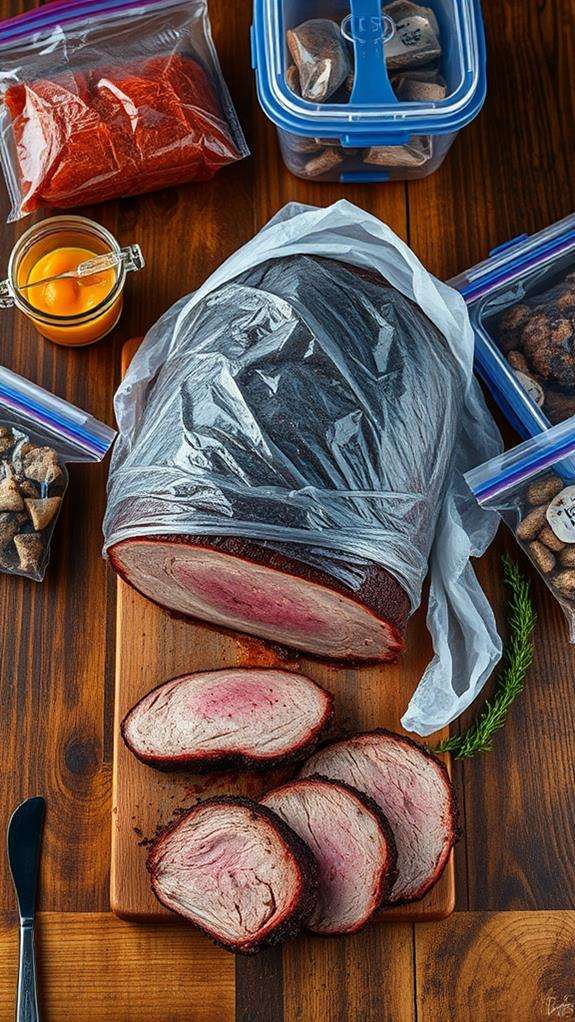
Storing your brisket properly is crucial to maintaining its quality and safety. When you’re dealing with a fresh brisket, imperative to store it in the refrigerator at a temperature of 40°F (4°C) or below, similar to ideal temperature for fresh crab storage. You should wrap it tightly in plastic wrap or aluminum foil and consume it within 3 to 5 days. If you don’t plan to cook it within that timeframe, consider freezing it. Properly frozen brisket can last up to 12 months while maintaining quality. When it comes to storing cooked brisket, you’ll want to refrigerate it within two hours of cooking. Make sure it cools down to room temperature first to prevent bacterial growth. Once refrigerated, cooked brisket can be stored for 3 to 4 days. If you want to keep it for longer, freezing is a great option. When you’re ready to eat it, simply thaw the frozen brisket in the refrigerator or reheat it in the oven or on the stovetop. Remember, freezing a brisket doesn’t affect its quality, so don’t hesitate to store it in the freezer for up to 12 months.
Freezing Methods and Precautions
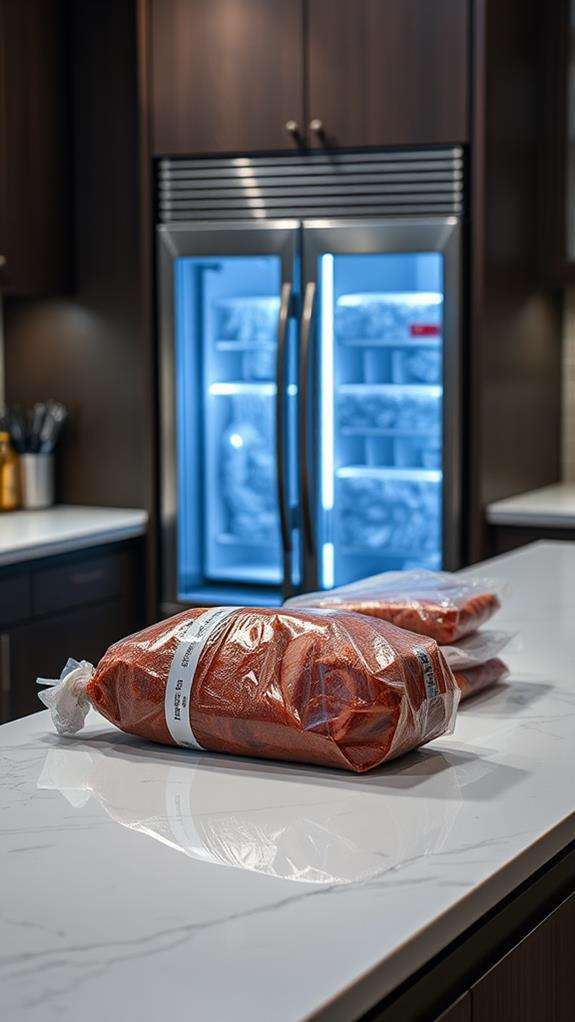
Freezing a brisket requires careful attention to detail to prevent freezer burn and maintain its quality. When freezing a raw brisket, verifying it is crucial to wrap it tightly in plastic wrap or aluminum foil to prevent air from reaching the meat. You can also use a vacuum sealer to remove excess air before freezing. Make sure to label the package with the date and contents. For example, if you’re using a slow cooker like the GreenPan Elite 8-in-1 Programmable 6QT Electric Slow Cooker with Healthy Ceramic Nonstick, you can cook your brisket beforehand and then freeze it. Additionally, consider the capacity of your freezer and the size of your brisket, as a 6-quart slow cooker like the GreenPan Elite can hold a 5-6 lbs. pork shoulder or 8-10 chicken thighs. Once wrapped, place the brisket in a deep freezer set at 0°F (-18°C) or below. The brisket is stored in the freezer for up to 12 months. If you’re freezing a cooked brisket, let it cool completely before wrapping and freezing. Frozen brisket can be used in a variety of recipes, from soups to sandwiches. Remember to always handle the brisket safely when freezing and storing it. Wash your hands before and after handling the meat, and guarantee all utensils and surfaces are clean. By following these precautions, you can enjoy your frozen brisket for months to come.
Thawing and Reheating Brisket
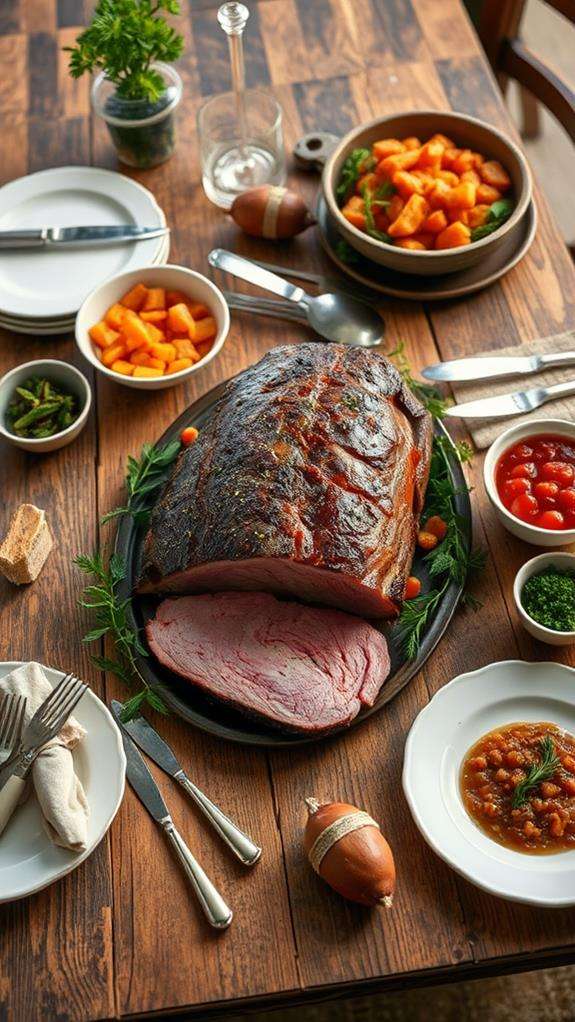
When it comes time to use your frozen brisket, you’ll need to thaw and reheat it safely and effectively. Freezing brisket helps preserve its texture and flavor, but thawing and reheating require attention to detail to maintain its quality. You can thaw your frozen meat in the refrigerator, cold water, or microwave, with refrigerator thawing taking 6-24 hours, depending on the size of the brisket. Using a reliable thermometer is vital to verify the internal temperature reaches USDA temperature guidelines for food safety. Additionally, understanding the concept of carryover cooking is pivotal to prevent overcooking and retain moisture. Cold water thawing takes 30 minutes to 2 hours, changing the water every 30 minutes, while microwave thawing takes 3-4 minutes per pound, checking and flipping every minute. Once thawed, reheat your brisket slowly and gently to prevent drying out, aiming for an internal temperature of 165°F (74°C) for food safety. Add juices or broths to maintain moisture and flavor, and use the oven, stovetop, or microwave, depending on your desired texture. To safeguard the quality of your brisket, you must reheat it correctly. By following these steps, you’ll be able to enjoy your previously frozen brisket, perfectly thawed and reheated.
Storage and Organization Tips
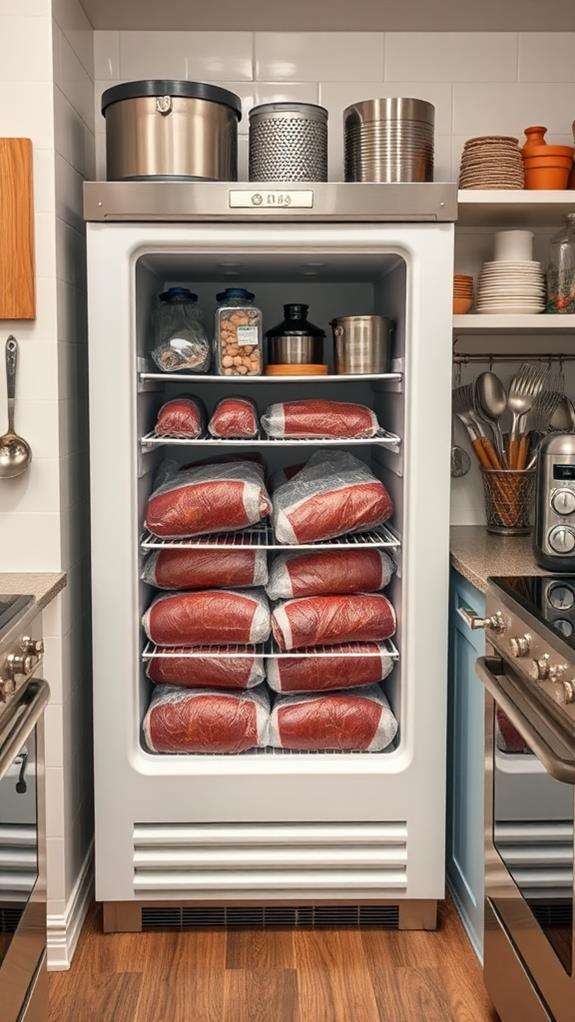
Now that you’ve got your brisket frozen, it’s time to think about storage and organization. You’ll want to make the most of your freezer space by stacking bags or containers neatly, and consider using vacuum-sealed bags or airtight containers to prevent freezer burn. By storing your brisket properly and organizing it by date, you’ll be able to keep track of how long it’s been frozen and guarantee you use the oldest ones first.
Freezer Space Maximization
As you prepare to store your frozen brisket, consider the importance of maximizing your freezer space to prevent clutter and guarantee easy access to your stored meat. Proper storage and organization can make a huge difference in maintaining the quality of your frozen brisket.
To help you optimize your freezer space, follow these tips:
| Freezer Space Maximization Tips | Description |
|---|---|
| Store by Date | Organize frozen brisket by date, with the oldest packages in front, and use a first-in, first-out system to confirm older brisket is consumed before newer ones. |
| Use Vacuum-Sealed Bags | Consider using vacuum-sealed bags or airtight containers to prevent freezer burn and maximize storage space. |
| Label and Divide | Label the bag or container with the date and contents for easy identification, and consider dividing the brisket into smaller portions before freezing for easier meal prep. |
| Stack Neatly | Stack bags or containers neatly to make the most of your available freezer space.
Proper Storage Methods
By strategically storing your frozen brisket, you’ll be able to maintain its quality and keep it fresh for a longer period. To achieve this, store the frozen brisket in the coldest part of the freezer, away from strong-smelling foods to prevent flavor transfer. When it comes to maximizing freezer space, organize the frozen brisket by stacking bags or containers neatly, and consider vacuum-sealing the brisket before freezing to remove air and prevent freezer burn. Proper storage is key, so make sure to utilize your freezer space efficiently. Vacuum-sealing the brisket will also help to keep it juicy and tender, even after 24 months. When done correctly, frozen brisket can remain fresh for an extended period, with vacuum-sealed brisket lasting longer than wrapped brisket. By following these proper storage methods, you’ll be able to enjoy your frozen brisket for a longer time.
Organization by Date
You’ve stored your frozen brisket properly, but how do you guarantee you use the oldest ones first? This is where organization by date comes in – a vital aspect of storage and organization tips. To maintain a first-in, first-out system, simply place the oldest packages of frozen brisket in front, making it easy to identify and consume them before newer ones. This method certifies you enjoy your frozen brisket before it’s too late, and you can rest assured that you’re getting the best flavor and texture.
When organizing your freezer, maximize space by stacking bags or containers neatly. Use airtight containers or freezer bags to store your frozen brisket, and don’t forget to label each bag or container with the date and contents for easy identification. If you’ve vacuum-sealed your brisket, you can breathe easy knowing it will last longer than wrapped brisket. By following these simple organization tips, you’ll be able to enjoy your frozen brisket for up to 24 months, knowing exactly which ones to use first.
Brisket Handling and Preparation
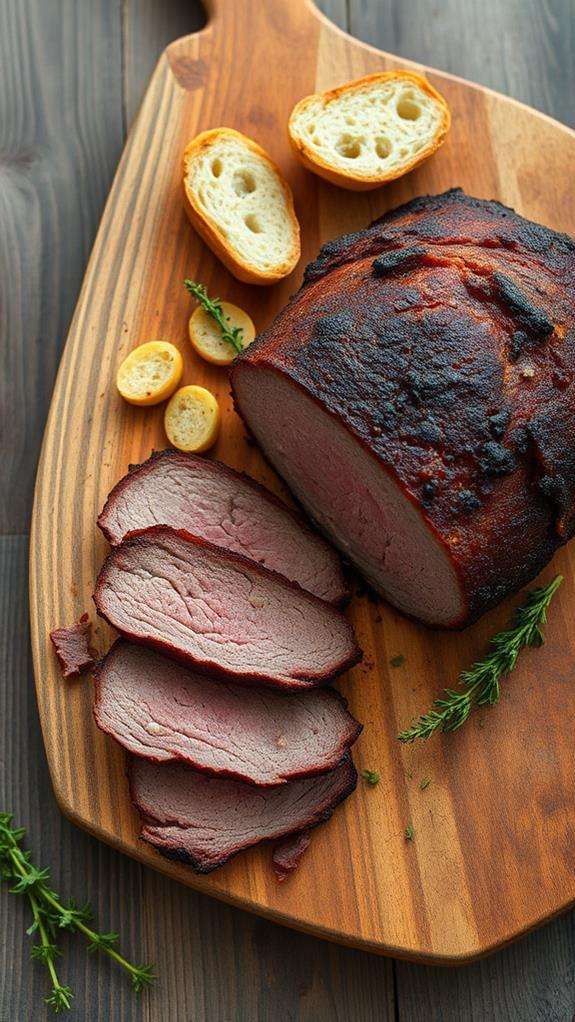
When it comes to handling and preparing brisket, proper techniques are essential to guarantee food safety and peak flavor. You need to know how to handle and store fresh and cooked brisket to secure a delicious and safe meal.
- Fresh brisket can be stored in the refrigerator for up to five days or frozen for six to twelve months.
- Cooked brisket can be stored in the refrigerator for up to four days without liquid or gravy, and up to two days with liquid or gravy.
- Brisket can be cooked in various ways, such as in a slow cooker, smoked for a tender and flavorful result, oven-roasted for a crispy exterior and tender interior, or braised in liquid for a tender and juicy result.
- Proper storage of fresh and cooked brisket helps prevent waste and is vital when cooking ahead of time, as improper storage can lead to spoilage and foodborne illness.
- Whether you’re working with packer briskets or a smoked brisket, proper handling and preparation techniques will make all the difference in the flavor and quality of your final dish.
Common Concerns and Misconceptions
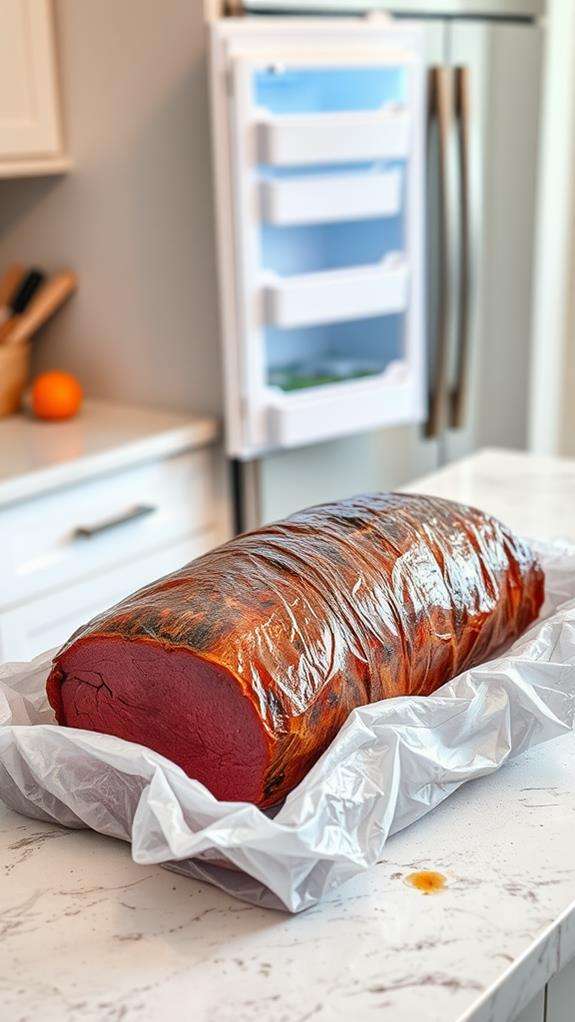
Freezing a question mark over your brisket’s storage and handling can lead to unnecessary stress, and misconceptions about brisket preparation can easily turn a delicious meal into a disaster. You might worry that freezing a brisket will affect its tenderness or flavor, but that’s not necessarily true. In fact, freezing can help preserve the quality of your raw meat. When you buy fresh briskets, they’re typically stored in a refrigerator at a temperature below 40°F (4°C) to prevent bacterial growth. If you plan to store your brisket for an extended period, freezing is a better option. A whole packer brisket, for instance, can be safely stored in the freezer for up to a year. Just make sure to wrap it tightly in plastic wrap or aluminum foil to prevent freezer burn. By understanding the basics of brisket storage and handling, you can enjoy a perfectly cooked, tender, and flavorful brisket without the stress of uncertainty.
Frequently Asked Questions
Can I Freeze a Raw Brisket?
You’re wondering if you can freeze a raw brisket. The answer is yes, you can! In fact, freezing is an excellent way to preserve a raw brisket’s quality and safety. When done correctly, frozen brisket can be stored for up to 12 months. Just make sure to wrap it tightly in plastic wrap or aluminum foil and place it in a freezer-safe bag to prevent freezer burn.
Does Freezing Affect Brisket?
When you think of a perfectly cooked brisket, you might imagine a tender, juicy slice, not a frozen block of meat. But does freezing really affect the quality of your brisket? Think of freezing like hitting pause on a movie – it slows down the aging process, allowing enzymes to break down connective tissues, making the meat more tender. However, repeated freezing and thawing can cause cell damage, affecting texture and flavor. So, freezing does impact your brisket, but with proper handling, it can still turn out delicious.
How to Freeze and Thaw Brisket?
When it comes to freezing and thawing a brisket, you’ll want to follow some specific steps. To freeze, wrap the raw brisket tightly with plastic wrap or aluminum foil to prevent freezer burn, and store it at 0°F (-18°C) or below. When you’re ready to thaw, place it in the refrigerator, allowing 24 hours per 5 pounds, or thaw it in cold water, changing the water every 30 minutes. Proper techniques will help maintain the brisket’s flavor and texture.
Does Pulled Brisket Freeze Well?
Imagine sinking your teeth into tender, juicy pulled brisket – a culinary delight that’s perfect for meal prep. Luckily, you can freeze pulled brisket with great results. Since it’s already shredded, it’ll reheat quickly and evenly, making it a convenient option for busy days. Just portion it out, vacuum-seal, and store it at 0°F (-18°C) or below. When you’re ready, simply reheat it to 165°F (74°C) and enjoy!
Conclusion
Now that you’ve got the lowdown on freezing brisket, you’re ready to tackle meal prep like a pro! Freezing brisket is like putting a pause on a great novel – when you’re ready, you can pick up right where you left off, and the story (or in this case, the flavor) remains intact. Just remember to follow the guidelines, and you’ll be enjoying tender, juicy brisket all year round.





